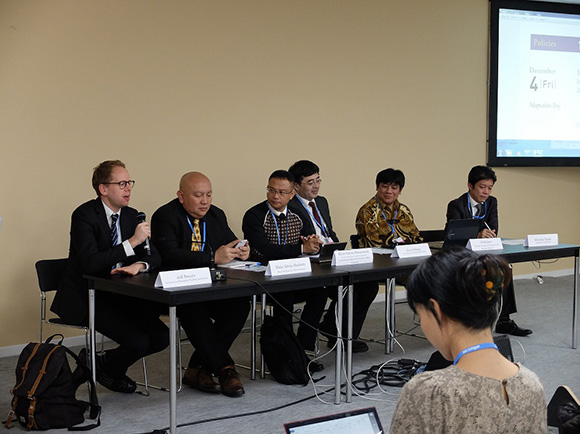Seminar on Capacity Development Activities for Low Carbon Development between Indonesia and Japan (through the Joint Crediting Mechanism)
JICA Indonesia Office
Outline
JICA’s technical assistance on Capacity Development for Low Carbon Development is supporting the operation of the Joint Crediting Mechanism. This seminar aims to introduce Indonesian experience from the assistance towards low carbon development including progress of and lessons learnt from the JCM in Indonesia. Examples are the technical issues related the mechanism operations, the policy issues such as linkages and arrangements between the other mitigation policies, and the remedy measures for those issues.
Program
-
- Opening Remarks
- Musdhalifah Machmud, Coordinating Ministry for Economic Affairs (CMEA), Indonesia (Indonesia)
Yuji Mizuno, Ministry of the Environment, Japan (Japan)
-
- Current status of JCM in Indonesia
- Rizal Edwin Manansang, Coordinating Ministry for Economic Affairs (CMEA), Indonesia (Indonesia)
-
- JICA Technical Cooperation on Low Carbon Development and Challenges of JCM in Indonesia
- Jun Ichihara, Japan International Cooperation Agency (JICA) (Project of Capacity Development Assistance for Low Carbon Development in the Republic of Indonesia (JICA-CMEA Project)) (Japan)
-
- JCM in implementation in Indonesia
- Shinsuke Yazaki, Kanematsu Corporation (Japan)
-
- Comment & Discussion
-
- [Discussants]
- Medrilzam, Ministry of National Development Planning / BAPPENAS, Indonesia (Indonesia)
Jeff Swartz, International Emissions Trading Association (IETA), Belgium branch (Belgium)
- [Moderator]
- Dicky Edwin Hindarto, Indonesia JCM Secretariat (Indonesia)
-
- Q&A
Summary
Opening Remarks
Ms. Musdhalifah Machmud, Deputy Minister for Food and Agriculture, Coordinating Ministry for Economic Affairs, Indonesia, stressed the importance and expectation to JCM as a tool to achieve Indonesian GHG reduction target by referring to Indonesian INDC and President Joko Widodo speech for COP21.
Dr. Yuji Mizuno, Ministry of the Environment, Japan introduced the 5 years of footprints of JCM and expressed his respect and gratitude for Indonesia as a leading country who has been working together with Japan.
Presentations and Discussion (Moderator: Mr. Dicky Edwin Hindarto, Head of Indonesia JCM secretariat)
- [Presentations]
- Dr. Rizal Edwin Manansang, Coordinating Ministry for Economic Affairs, Indonesia, introduced progress of Indonesian JCM activities comprehensively, such as the history since 2010, the fundamental institutional structure (e.g. Joint Committee members of ministries), the size of investment mobilized, the numbers of projects and methodologies. He also mentioned some of recent activities such as city-to-city cooperation, Sustainable Development indicators and procedures.
Dr. Jun Ichihara, JICA (JICA expert for JICA-CMEA Project), introduced the progress, achievement, and lessons learned from JICA-CMEA project which supported the Indonesian JCM activities. He also pointed out the challenges to be addressed, partly referring to some comparison between CDM and JCM, such as promoting project finance, streamlining with the other domestic climate change (mitigation) policies, and further capacity building of stakeholders.
Mr. Shinsuke Yazaki, Kanematsu Corporation, introduced two projects based on the experiences as a project participant of JCM in Indonesia. The first project “Introduction of high efficient process plant at Paper Factory” is an energy efficiency project. And the other project “REDD+ project in Boalemo District” is the first REDD+ implementation project.
- [Discussions]
- Dr. Medrilzam, Ministry of National Development Planning / BAPPENAS, Indonesia presented his comment on linkage between JCM and INDC. He pointed out that JCM has an aspect as a mitigation (GHG reduction) measure, but at the same time it has an aspect as a financing tool which is very significant for all of climate change measures. He also agreed that streamlining the domestic climate change (mitigation) policies is quite significant for the Indonesia.
Mr. Jeff Swartz, International Emissions Trading Association (IETA), explained that the negotiation regarding market mechanism is very slow, and global carbon trading is stagnant. But at the same time, he expressed his expectation to Indonesian JCM which shows very steady progress by referring to the recent movement of establishing market in Asian such as China and Korea, both had started the domestic cap and trade emissions trading scheme.
Q&A session
Q (Indonesia (government)): Like the forest project, is there any possibility for JCM to contribute more to both mitigation and adaptation?
A (Dr. Medrilzam): It would be possible especially for land-based sector activity. The linkage between adaptation and mitigation is very important.
A (Dr. Edwin): We will seek the possibility, and we also need to consider the newly established Sustainable Development evaluation process and implementation.
A (Mr. Yazaki): It is a matter of scaling. If the scale is getting bigger from community, local area, and provinces, we need to think about the linkage between mitigation and adaptation.
Q (East Timor (government)): What is the relationship between cacao farming and avoiding forest degradation in REDD+ project introduced by Mr. Yazaki?
A (Mr. Yazaki): Our project aims to do technical transfer to the farmers about cacao plantation, as well as provide value chain of cacao selling. It will provide the additional option to the farmers which could be an alternative to the corn farming which require slush and burn, a cause of forest degradation.
Q (UK (government)): I would like to know more information about the comparison between CDM and JCM and challenge to be addressed?
A (Dr. Ichihara): There are some comparison reports between CDM and JCM to be referred. But further analysis will be useful.
Key Messages
- Indonesia JCM is a leading country among JCM agreement countries in terms of developing new rules and procedures as scheme documents, the number of methodologies, the number of projects, active information dissemination activities, and project monitoring and evaluation by the secretariat.
- One of the potential obstacles of Indonesia JCM projects is financing. Indonesian INDC also recognizes the importance of market mechanism including JCM. It is a challenge to be addressed to identify financial sources and promote and implement financing.
- Currently, there are several climate change related policies in Indonesia. To further promote Indonesia JCM, it is expected to identify the linkage among the domestic climate policies such as JCM and national mitigation action plan and streamlining those.
Photograph
Reporters
Jun Ichihara, Noriko Hase, JICA Indonesia Office (Project of Capacity Development Assistance on Low Carbon Development)








